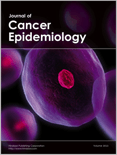
Journal of Cancer Epidemiology
Scope & Guideline
Advancing knowledge in cancer epidemiology for a healthier tomorrow.
Introduction
Aims and Scopes
- Epidemiological Studies:
The journal emphasizes the importance of epidemiological research in understanding cancer incidence, prevalence, and risk factors across different populations and demographics. - Cancer Risk Assessment:
It focuses on identifying and analyzing various risk factors associated with different types of cancer, including lifestyle, environmental, and genetic factors. - Public Health Implications:
The journal aims to bridge research findings with public health policies, advocating for effective cancer prevention and control strategies. - Global and Local Perspectives:
It provides a platform for research that examines cancer trends and risk factors in both global contexts and localized studies, enhancing the understanding of regional cancer issues. - Innovative Methodologies:
The journal showcases innovative research methodologies, including scientometric analyses and narrative reviews, to deepen insights into cancer research and inform future studies.
Trending and Emerging
- Immunotherapy and Cancer Treatment Innovations:
Research focusing on immunotherapy and its implications for cancer treatment is on the rise, reflecting a broader trend in oncology towards personalized medicine and targeted therapies. - Cancer Disparities and Equity:
There is an increasing focus on understanding cancer disparities among different populations, particularly marginalized groups, emphasizing the need for equitable healthcare access and outcomes. - Population-Based Cancer Registries:
The utilization of population-based cancer registry data is trending, as it provides critical insights into cancer incidence and survival rates across diverse demographics. - Socioeconomic and Environmental Influences on Cancer:
Emerging research themes are increasingly examining the interplay between socioeconomic status, environmental factors, and cancer risk, highlighting the complexity of cancer epidemiology. - Cross-Sectional and Retrospective Studies:
There is a growing trend towards using cross-sectional and retrospective studies to gather data on cancer awareness, risk factors, and treatment outcomes, enhancing the evidence base for future interventions.
Declining or Waning
- Traditional Risk Factor Studies:
There appears to be a waning emphasis on studies solely focused on traditional risk factors for cancer, as newer research increasingly integrates multifactorial approaches and more complex analyses. - General Cancer Awareness Campaigns:
Research related to general cancer awareness campaigns is less prevalent, possibly due to a shift towards more targeted interventions and studies that focus on specific populations or types of cancer. - Single-Cancer Type Studies:
There is a noticeable decline in studies that focus exclusively on a single type of cancer, with more research now exploring multi-cancer associations or comparative analyses across different cancer types.
Similar Journals

Cancer Research Communications
Innovating cancer treatment through shared insights.Cancer Research Communications is an esteemed journal published by the American Association for Cancer Research, a leading organization in the field of oncology. This journal aims to advance knowledge in cancer research through the dissemination of high-quality, peer-reviewed articles that cover a wide range of topics related to cancer biology, treatment modalities, and prevention strategies. As an open-access journal, Cancer Research Communications ensures that vital research findings are accessible to a global audience, promoting collaboration and innovation within the scientific community. The journal serves as a crucial platform for researchers, professionals, and students to share their insights and foster the exchange of effective cancer therapies and methodologies. With a commitment to excellence, it plays a significant role in shaping the future of cancer research and therapeutic development.
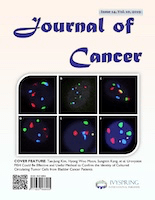
Journal of Cancer
Advancing oncology through groundbreaking research.Journal of Cancer is a premier, peer-reviewed academic journal published by IVYSPRING INTERNATIONAL PUBLISHING that focuses on advancing the field of oncology. With an impact factor reflecting its significant contributions, this journal ranks in the 80th percentile of medical journals pertaining to oncology, positioning it at #79 out of 404 in Scopus. Since its inception in 2010, the journal has embraced an Open Access model, ensuring that groundbreaking research reaches a global audience without barriers. Based in Australia, the journal addresses a wide array of topics within cancer research, catering to researchers, healthcare professionals, and students committed to enhancing their understanding of the complexities of cancer. Amidst evolving challenges in oncology, the Journal of Cancer serves as a vital platform for disseminating innovative findings, fostering collaboration, and promoting informed decisions that can lead to improved cancer outcomes worldwide.

South Asian Journal of Cancer
Connecting researchers for a cancer-free future.South Asian Journal of Cancer, published by GEORG THIEME VERLAG KG, is a pivotal platform for research in the fields of oncology and cancer research. Established in 2012 and operating under an Open Access model, this journal aims to disseminate high-quality, peer-reviewed articles that address crucial developments in cancer treatment, prevention, and research, particularly within the South Asian context. Despite its young history, the journal has been positioned within the Q4 quartile for both Cancer Research and Oncology, and while current Scopus rankings indicate it resides in the lower percentiles, its commitment to amplifying regional voices and research is invaluable. With its headquarters in Stuttgart, Germany, and a global readership, South Asian Journal of Cancer is dedicated to enhancing collaboration among researchers, healthcare professionals, and students, fostering a space for innovative ideas and advancements in cancer care as we progress through to 2024.
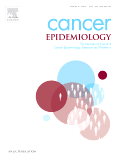
Cancer Epidemiology
Pioneering Research for a Cancer-Free FutureCancer Epidemiology, published by ELSEVIER SCI LTD, serves as a premier platform for disseminating innovative research in the areas of cancer epidemiology and oncology. Operating from the Netherlands, this journal provides a critical insight into the factors influencing cancer incidence, including genetic, environmental, and lifestyle variables. With an impact factor reflecting its significance in the field, it holds a respectable Q2 ranking in Cancer Research, Epidemiology, and Oncology. The journal spans a wide range of topics and publishes studies that aim to bridge gaps in existing literature through rigorous research methodologies. Researchers and professionals interested in acquiring the latest insights and contributing to the evolving discourse on cancer epidemiology will find this journal an invaluable resource. Access to articles may be available through open access options, ensuring the widest dissemination of knowledge.
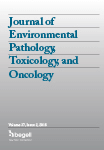
JOURNAL OF ENVIRONMENTAL PATHOLOGY TOXICOLOGY AND ONCOLOGY
Decoding Environmental Risks to Enhance Public HealthJOURNAL OF ENVIRONMENTAL PATHOLOGY TOXICOLOGY AND ONCOLOGY, published by BEGELL HOUSE INC, serves as a vital platform for researchers and professionals engaged in the interdisciplinary fields of environmental health, pathology, and toxicology. With a history spanning from 1984 to the present, the journal is dedicated to disseminating high-quality research that explores the complexities of environmental threats to human health and their pathological implications. Its current ranking in the Q3 category across key areas including Health, Toxicology and Mutagenesis, Medicine (miscellaneous), and Pathology and Forensic Medicine underscores its relevance in the academic landscape. Despite not being an open-access journal, it remains an essential resource for those seeking to understand the impact of environmental factors on health outcomes. The journal's rigorous peer-review process and commitment to advancing knowledge make it an indispensable tool for students, researchers, and professionals striving to address pressing health and environmental challenges.
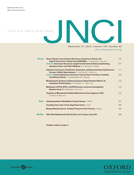
JNCI-Journal of the National Cancer Institute
Unveiling the complexities of cancer for better outcomes.JNCI-Journal of the National Cancer Institute, published by Oxford University Press Inc. in the United Kingdom, is a premier journal dedicated to advancing the field of cancer research and oncology. With a distinguished history dating back to 1940, this journal has consistently maintained a strong reputation within the academic community, achieving a remarkable Q1 ranking in both Cancer Research and Oncology as of 2023. Researchers and practitioners rely on the JNCI for original research articles, review papers, and cutting-edge findings that impact clinical practices and therapeutic strategies. Although it does not currently offer open access, the journal remains a vital resource for academicians and healthcare professionals seeking to enhance their understanding of cancer mechanisms and treatment innovations. Its rigorous peer-review process ensures the publication of high-quality, credible research that meets the evolving challenges of cancer treatment and prevention through to 2024.
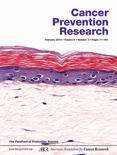
Cancer Prevention Research
Transforming insights into impactful prevention strategies.Cancer Prevention Research, published by the American Association for Cancer Research, is a leading journal dedicated to advancing our understanding of cancer prevention strategies and their implementation in public health. With an ISSN of 1940-6207 and E-ISSN 1940-6215, this journal serves as a pivotal platform for researchers, healthcare professionals, and students who are committed to unraveling the complexities of cancer etiology and preventive measures. Since its inception in 2008, the journal has carved a niche in the scientific community, achieving notable rankings including Q2 in Cancer Research and Q1 in both Medicine (miscellaneous) and Oncology, highlighting its significance in disseminating influential research. Cancer Prevention Research is indexed in Scopus, reflecting a robust impact factor, and features a range of articles that address the preventive aspects of cancer to promote healthier populations. With access options available, it invites contributions that bridge laboratory findings with epidemiologic insights, making it an essential resource for anyone dedicated to reducing the burden of cancer globally.

Cancer Medicine
Exploring breakthroughs in oncology and radiology.Cancer Medicine is a leading open access journal published by WILEY, focusing on innovative research and advancements in the fields of Cancer Research, Oncology, and Radiology, with an impressive impact evidenced by its 2023 Q2 ranking in Cancer Research and Q1 rankings in both Oncology and Radiology, Nuclear Medicine and Imaging. With an ISSN of 2045-7634, this journal has been committed to disseminating pivotal findings since its inception in 2012, serving as a vital platform for researchers, practitioners, and students alike. The journal proudly embodies the spirit of open access, ensuring that groundbreaking cancer research is accessible to a global audience. Located in the United Kingdom, it spans a wide array of topics, promising comprehensive insights into cancer therapies, molecular mechanisms, and imaging techniques, thereby significantly contributing to the enhancement of cancer care and treatment outcomes. Researchers interested in exploring the latest advancements in cancer medicine will find this journal an indispensable resource.

Middle East Journal of Cancer
Exploring innovative solutions in cancer studies.Middle East Journal of Cancer, with an ISSN of 2008-6709 and an E-ISSN of 2008-6687, is a prominent open-access journal published by Shiraz University of Medical Sciences since 2010. Based in Iran, the journal aims to advance the knowledge and understanding of cancer research and oncology through the dissemination of high-quality, peer-reviewed articles. With open access availability, it promotes global collaboration and accessibility in research, making findings readily available to a wider audience. The journal is categorized in Q4 for both Cancer Research and Oncology as of 2023, highlighting its emerging presence in these fields. Alongside its Scopus ranks, where it positions 319th out of 404 in Medicine - Oncology and 198th out of 230 in Biochemistry, Genetics and Molecular Biology - Cancer Research, it serves as a platform for researchers, professionals, and students to enrich their expertise and contribute to the evolving landscape of cancer studies. The journal's continuous commitment to quality and accessibility represents an essential resource for those dedicated to advancing cancer research and improving patient outcomes in the Middle East and beyond.
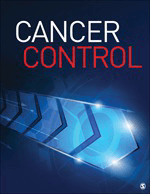
Cancer Control
Transforming insights into impactful cancer solutions.Cancer Control is a prominent open-access journal published by SAGE Publications Inc, dedicated to advancing the field of oncology, hematology, and general medicine since its inception in 1995. With a focus on disseminating high-quality research, the journal contributes significantly to the knowledge base surrounding cancer prevention, treatment, and survivorship, making it a vital resource for researchers, healthcare professionals, and students alike. The journal currently holds a commendable position in the academic landscape, ranking in the Q2 category for both Hematology and Oncology, highlighting its impact and scholarly relevance. Available in an open-access format since 2018, Cancer Control ensures that critical findings are accessible to a broad audience, promoting collaboration and innovation in cancer-related research. Whether you're interested in the latest clinical trials, epidemiological studies, or public health initiatives, this journal serves as a key platform for sharing significant developments in cancer care and control.